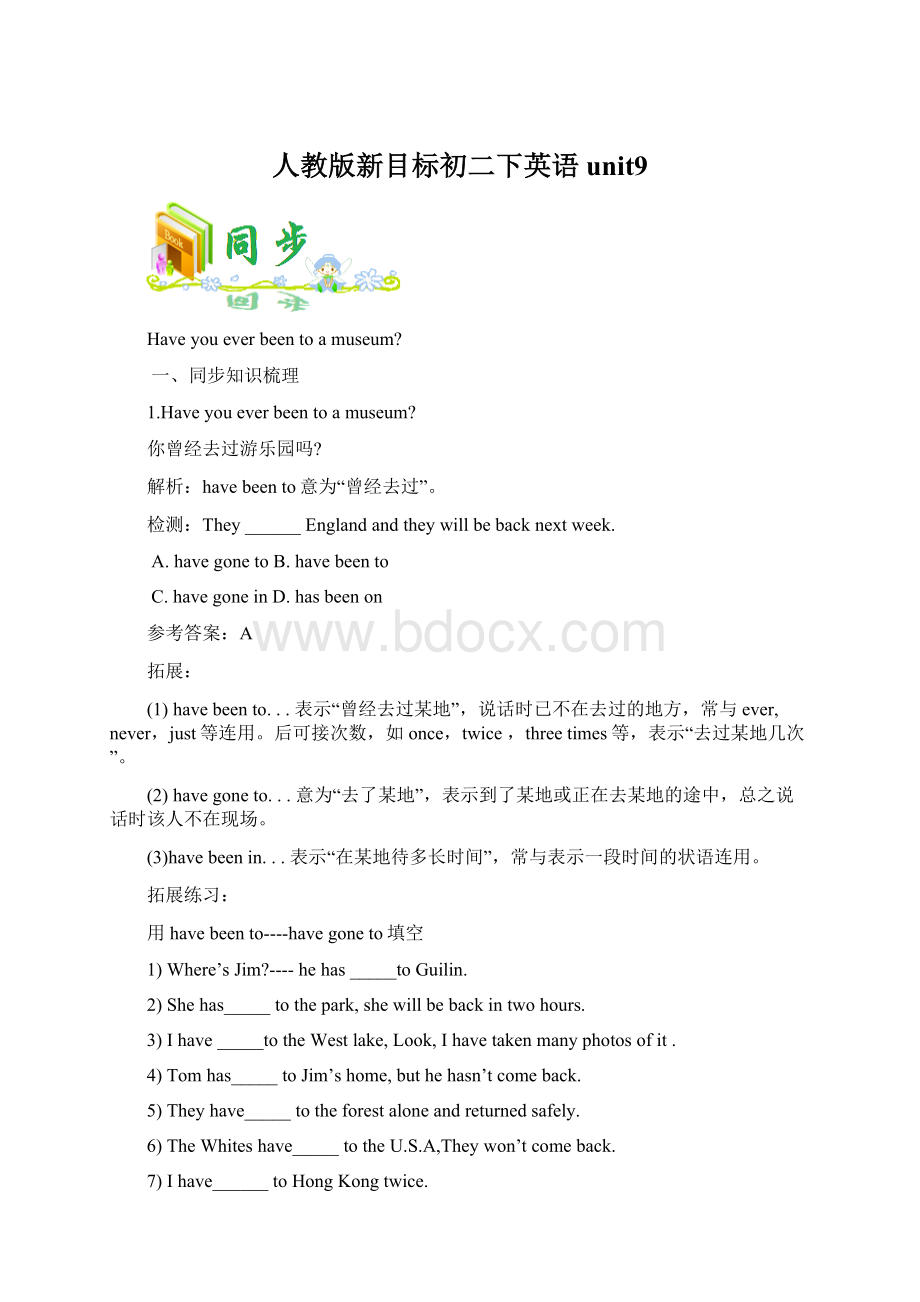人教版新目标初二下英语unit9.docx
《人教版新目标初二下英语unit9.docx》由会员分享,可在线阅读,更多相关《人教版新目标初二下英语unit9.docx(16页珍藏版)》请在冰豆网上搜索。

人教版新目标初二下英语unit9
Haveyoueverbeentoamuseum?
一、同步知识梳理
1.Haveyoueverbeentoamuseum?
你曾经去过游乐园吗?
解析:
havebeento意为“曾经去过”。
检测:
They______Englandandtheywillbebacknextweek.
A.havegonetoB.havebeento
C.havegoneinD.hasbeenon
参考答案:
A
拓展:
(1)havebeento...表示“曾经去过某地”,说话时已不在去过的地方,常与ever,never,just等连用。
后可接次数,如once,twice,threetimes等,表示“去过某地几次”。
(2)havegoneto...意为“去了某地”,表示到了某地或正在去某地的途中,总之说话时该人不在现场。
(3)havebeenin...表示“在某地待多长时间”,常与表示一段时间的状语连用。
拓展练习:
用havebeento----havegoneto填空
1)Where’sJim?
----hehas_____toGuilin.
2)Shehas_____tothepark,shewillbebackintwohours.
3)Ihave_____totheWestlake,Look,Ihavetakenmanyphotosofit.
4)Tomhas_____toJim’shome,buthehasn’tcomeback.
5)Theyhave_____totheforestaloneandreturnedsafely.
6)TheWhiteshave_____totheU.S.A,Theywon’tcomeback.
7)Ihave______toHongKongtwice.
8)Wehave_____totheMountTai,weallenjoyedourselves.
参考答案:
gone/gone/been/gone/been/gone/been/been
2.Meneither.Let’sgotoonetomorrow.
我也没有,我们明天一起去吧。
解析:
neither也不(否定回答,前一句为否定句)
检测:
—Ihaven’tbeentoawaterpark.
— 我也是。
参考答案:
Me,neither.
拓展:
(1)用于句子开头,其后要用倒装语序,即将主语放在动词之后。
—Ihaven’tbeentoawaterpark.
—NeitherhaveI.
我也是。
(2)neither+单数名词:
两者都不
NeithercarismadeinChina.
两辆汽车都不是中国制造的。
(3)neitherof作主语,表示“两者都不”
(限定于两者之间),谓语动词常用单数形式(也可用复数形式)。
Neitherofthemwas/werelateforschool.
他们两个上学都没有迟到。
(4)neither...nor...意思是“既不……也不……”,连接两个并列成分。
注意:
该固定结构作主语时,谓语动词遵循就近原则,动词的单复数同最近的主语保持一致。
TheweatherinKunmingisneithertoohotnortoocold.
昆明的天气既不太热也不太冷。
NeitherthetwoteachersnorthatstudentisfromAmerica.
那两个老师和那个学生都不是来自美国。
拓展练习:
(改写句子)
1.Anndoesn’tlikepopularsongs.Idon’tlikethem,either.
Anndoesn’tlikepopularsongs.__________________.
2.DavidandJackdidn’tgototheamusementpark.
_______David______Jackwenttotheamusementpark.
参考答案:
NeitherdoI/Neithernor
3.Ilearnedabouttheinventionsthatledtocolormovies,too.我还了解了一些发明,它们成就了彩色电影。
解析:
此处learn是“了解;获知;得知”的意思,由介词about或of引入所获知的具体内容。
【例如】
Thechildrenwereallshockedtolearnofthedeathoftheirheadmaster.
得知校长去世,孩子们都十分震惊。
Ionlylearnedabouttheaccidentlater.我只是后来才得知了事故的情况。
【检测】
翻译:
我了解了一些电影的知识。
I____________someinformationaboutmovie.
他的粗心导致了这次失败。
Hiscarelessness__________thisfailure.
参考答案:
learnedabout/ledto
4.I’veneverbeencamping.我从未野营过。
解析:
此句为现在完成进行时。
这一时态的结构为“havebeen+现在分词”,表示从过去某一时刻延续至今的动作。
在本句中,说话人使用这一时态来强调自己至今从未有过野营的经历,欠缺这方面的经验。
又如:
He’sbeenwatchingTVallafternoon.
他一下午都在看电视。
We’vebeenlivinglikethiseversincethebirthofmylittlebrother.
自打我小弟弟出生,我们就一直这样生活。
检测:
1.我去过北京两次。
I_________________Beijingtwice.
2.Theyhaveboughtacomputer.(改成否定句)
___________________________________
3.Hehaslosthisbook.(先改成一般疑问句,再作肯定与否定回答)
___________________________________
___________________________________
参考答案:
havebeento/Theyhavenotboughtacomputer./Hashelosthisbook?
Yes,hehas/No,hehasn’t.
5.Theoldcomputersweremuchbigger.旧式电脑更大。
解析:
much可修饰形容词比较级,表示……得多。
如:
muchricher
alittle,even,abit也可以修饰形容词比较级。
检测:
HeisstrongerthanTom.
AmuchBmoreCveryDthemost
参考答案:
A
6.Iwonderhowmuchmorecomputerwillbeabletodointhefuture.不知道将来电脑还能够做些什么事情呢。
解析:
1)wonder表示“(对某事)感到疑惑;想要知道;想弄明白;琢磨”,后面常接由what,how,who或者if/whether引导的宾语从句。
e.g.Iwonderhowthey’regettingon.我想知道他们现在过得怎样。
Ijustwonderifthey’vearrivedsafely.我就想知道他们是否安全抵达了。
2)此句从句部分的原始结构是:
Howmuchmorewillcomputersbeabletodointhefuture?
是对陈述句Computerswillbeabletodo(much)moreinthefuture.(电脑将来能够做更多的事情。
)的提问。
由于充当了宾语从句,疑问结构改成了陈述结构:
howmuchmorecomputerswillbeabletodointhefuture,即:
将助动词还原到陈述句的位置。
e.g.Idon’tknowwhenhewillcome.我不知道他什么时候来。
Idon’tknowwherehelives.我不知道他住在哪里。
检测:
1.MissGreendidn’ttellus_______in2009.
A.wheredoessheliveB.Whereshelives
C.wheredidsheliveD.whereshelived
2.Woul
dyoupleasetellme________?
A.whendidhecomehome
B.wherehewouldplayfootball
C.ifhehadseenthefilm
D.whyhedidn’twatchthegame
3.Idon’tknowwhen__________.
A.willthetrainleaveB.thetrainwillleave
C.wouldthetrainleaveD.thetrainleave
4.—Excuseme.Couldyoutellme?
—Itwillleaveat4:
00p.m.
A.howwillyougoShanghaiB.howyouwillgotoShanghai
C.whenwillthebusleaveforShanghaiD.WhenthebuswillleaveforShanghai
5.-CanIjoinyou?
-Sure,wearetalkingabout_____.
A.whenshallwegotothemovie
B.howcanwegothere
C.whoshouldwegowith
D.whywelikethemovie
参考答案:
DDBDD
7.Italsoencouragesgovernmentsandsocialgroupstothinkaboutwaysto…
解析:
encouragesb.todosth.
鼓励某人做某事
e.g.Myfatherencouragedmetotakepartinthesportsmeeting.
父亲鼓励我参加运动会。
拓展:
encourage动词,意为“鼓励”,后接动词不定式。
encouragesb.(not)todosth.鼓励某人(不)去干某事。
类似用法的词有:
tell(告诉),invite(邀请),allow(允许),ask(请求),want(想要),afford(付得起),decide(决定),help(帮助),hope(希望),learn(学会),plan(计划),pretend(假装),seem(觉得好像),promise(答应),refuse(拒绝),wish(希望),expect(预料;盼望;认为),happen(碰巧)。
检测:
(1)WhenIfailed,healwaysencouragedme(try)again.
(2)Theydecided(tell)methetruth.
(3)—DoyouthinkBrazilwillbeatJapaninthenextmatch?
—Yes,theyhavebetterplayers,soI________themtowin.
A.hopeB.except
C.expectD.prefer
参考答案:
totry/totell/C
8.Watchingtheteapreparationisjustasenjoyableasdrinkingtheteaitself.
看沏茶的过程和饮茶本身一样令人愉快。
-able是一个典型的形容词后缀,可加在动词之后,表示“可…..的;能够……的”。
此处enjoyable(能使人快乐的;令人愉快的)便是一例,再如:
drinkable(可饮用的),washable(可洗的),readable(可读的),usable(可用的;可使用的)等等。
检测:
Watchingmoviesisveryeforme.
参考答案:
enjoyable
9.Ontheonehand,morethanthreequartersofthepopulationareChinese,soyoucansimplyspeakPutonghuaalotofthetime.在一方面,超过四分之三的人口是华人,所以很多时候,你可以简单地说普通话。
Ontheotherhand,SingaporeisanEnglish-speakingcountry,soit’salsoagoodplacetopracticeyourEnglish.
另一方面,新加坡是一个英语国家,所以它也是一个练习英语的好地方。
解析:
ononehand,ontheotherhand一方面,另一方面
Ononehand,lossimplygain;ontheotherhand,gainimplyloss.
塞翁失马,安知非福;塞翁得马,安知非祸。
检测:
翻译:
一方面,我想去那个派对;但另一方面,我不得不学习。
参考答案:
Ononehand,Iwanttogototheparty,butontheotherhand,Ihavetostudy.
10.Youwon’thaveanyproblemgettingrice,noodlesordumplings.吃米饭、面条、饺子,都没有任何问题。
解析:
Haveproblemsdoingsth做某事有问题
Didyouhaveanyproblems(=difficulties)gettinghere?
你到这儿来遇到困难了吗?
同类拓展:
(1)havetrouble(in)doingsth,表示“做某事有困难”。
如:
Hewashavingtroublehearingher.他发现要听清楚她说话很困难。
(2)havefun(in)doingsth,表示“做某事有意思(有趣)”。
如:
Wehadgreatfuncomparingourbabypictures.我们比较宝宝的照片觉得很有趣。
检测:
翻译:
1.我们今天骑自行车去海边玩得很开心。
2.起初她上课听讲有点困难。
参考答案:
1.Wehadfunridingourbicyclestothebeachtoday.
2.Atfirstshehadalittletroublefollowingthelectures.
现在完成时学习
一.基本结构:
助动词have/has+过去分词(done)
二.含义:
1.过去发生的动作对现在造成的影响或结果
Ihavejusteatenmybreakfast.(现在我不饿)
2.过去已经开始,持续到现在的动作或状态
Ihavelivedherefortwoyears.
Ihavelivedheresince2008(twoyearsago).
三.句型:
四.现在完成时的标志:
(1)常与just,already,yet,ever,never,before,sofar等连用,强调动作的完成,不强调动作的持续。
①just(刚刚)e.g:
Ihavejusthadmybreakfast.
②never(从未)ever(曾经→疑问句)e.g:
--Haveyoueverwatchedthefilm?
--No.Ihavenever.
③before(以前)e.g:
Wehavemeteachotherbefore.
sofar(目前;迄今为止)e.g:
IhavebeentoBeijingtwicesofar.
(2)for+时间段;since+过去的时间点;since+时间段ago;since+一般过去时的句子。
如:
Theyhaveknowneachotherforfiveyears.
Sincehewasachild,hehaslivedinEngland.
Tomworksinthecompanysince2011.
Tomworksinthecompanysince3yearsago.
练一练:
用nevereverjustalreadyyetforsince填空
(1)Haveyou_____beentoJapan?
(2)Ihave_____finishedmyhomework.
(3)Ihaven’tfinishedmyhomework____.
(4)Ihave_______beentoTibet.SoIwillgothereduringthissummer.
(5)Ihavelivedhere____lastyear.
(6)Ihavelivedhere____oneyear.
(7)Ihavebeentosevencountries__________.
(ever,already,yet,never,since,for,sofar)
现在完成时多与哪些时间状语连用
(1)for+时段e.g:
I’velearnedEnglishfor5years.
(2)yet(还;尚未→否/疑问句) e.g:
--Haveyoufinishedyourhomeworkyet?
--No,Ihaven’tyet.
(3)just(刚刚)e.g:
Ihavejusthadmybreakfast.
(4)never(从未)ever(曾经→疑问句)e.g:
--Haveyoueverwatchedthefilm?
--No.Ihavenever.
(5)before(以前)e.g:
Wehavemeteachotherbefore.
(6)sofar(目前;迄今为止)e.g:
IhavebeentoBeijingtwicesofar.
(7)since+时间点2yearsago
2008.
e.g:
Ihavelivedheresince1998.
五.
(1)hasgone(to),hasbeen(to),hasbeen(in)的区别
have/hasgone(to):
去了(现在不在说话现场)
e.g:
Whereisyourfather?
HehasgonetoShanghai.
have/hasbeen(to):
去过(已不在去过的地方)
e.g:
MyfatherhasbeentoShanghai.
have/hasbeenin:
呆了多久(还在所呆的地方)
e.g:
MyfatherhasbeeninShanghaifortwomonths./sincetwomonthsago.
六、有关短暂性动词
(1)短暂性动词在现在完成时中不能和表示一段时间的状语连用,但在否定句中可以和表示一段时间的状语连用。
(2)短暂性动词不能出现在由howlong引导的疑问句中,但可以和already,never,just,ever,before等连用。
短暂性动词的用法:
(1)短暂性动词与短暂性时间(时间点)连用。
如:
HejoinedthePartythreeyearsago.他入党三年了。
(他三年前入党的)
(2)用“Itis/hasbeen+时间段+since...”句型。
如:
Itis/hasbeenthreeyearssinceIboughtthebook.这本书我买了三年了。
(从买这本书起到现在已三年了)
(3)短暂性动词转换成延续性动词或形容词、介词等表状态短语可与“for+时间段”或“since+时间点”连用。
buy----haveborrow-----keepcome/arrive/reach/getto-----bein
goout----beoutleave----beawaybegin-----beonfinish----beover
open----beopenclose-----becloseddie----bedeadgotoschool----beastudent
join----bein或beamemberof…fallill(sick,asleep)----beill(sick,asleep)comeback--bebackcatch(acold)--have(acold) gettoknow--knowbegintostudy--study close --beclosed
课堂检测:
一、现在完成时练习:
用nevereverjustalreadyyet填空
(1)Haveyou_____beentoJapan?
(2)Ihave_____finishedmyhomework.
(3)Ihavefinishedmyhomework______.
(4)